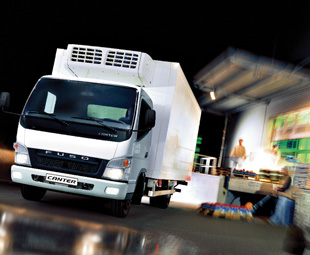Ensure the smooth flow of goods

Suppliers of fast-moving consumer goods (FMCG) have the unique challenge of transporting perishable and breakable goods – often across long distances and to tight schedules. Being able to locate vehicles and loads, while optimising delivery schedules, is imperative. CLAIRE RENCKEN takes a closer look
FMCG suppliers need to get finished goods into the hands of their customers on time and in perfect condition. It helps to have access to real-time data and always-on communications. There are various fleet-management solutions available on the market that can assist in this regard.
MiX Telematics, for example, offers MiX Fleet Manager Premium – an end-to-end solution designed to give fleet operators the tools they need to sustain a high-performing operation, which operates at optimum levels of efficiency and safety.
According to the company, MiX Fleet Manager gives immediate access to secure information about drivers and vehicles at all times. Customer support is provided 24-hours a day. MiX Fleet Manager provides a real-time view of the current position and movement of the assets and shows which drivers are driving the vehicles.
Tracking, live information streams and reporting tools are provided through an advanced software platform. The solution comprises an on-board computer, an online tracking and information portal, the MiX Fleet Manager mobile application, as well as access to valuable fleet and driver reports and analytics, so that fleet information can be scrutinised in detail, based on user-defined selections.
When using MiX Fleet Manager Premium, fleet managers can:
• Monitor, manage and improve driver behavior;
• Reduce fuel and maintenance costs;
• Analyse activity timelines that illustrate utilisation patterns to improve productivity;
• Enhance customer service with the “find-nearest-vehicle” function to assign a job to the driver closest to a specific customer;
• Improve driver safety and reduce risk; and
• Manage servicing and licensing schedules through automated reminders. Reminders can be configured to trigger when the set distance, duration or engine hours have been reached.
 Vehicles are fitted with a small on-board computer that captures and transmits vehicle and driver data. Users can then access this information online, via the solution’s web-based software platform. Some features are also available via MiX Fleet Manager Mobile, the solution’s free app for Android and iOS devices. Both web and mobile interfaces are easy to navigate and are compatible with multiple browsers and operating systems. So, data and reports are available around the clock from any internet-enabled computer, as well as from smartphones and/or tablet devices.
Vehicles are fitted with a small on-board computer that captures and transmits vehicle and driver data. Users can then access this information online, via the solution’s web-based software platform. Some features are also available via MiX Fleet Manager Mobile, the solution’s free app for Android and iOS devices. Both web and mobile interfaces are easy to navigate and are compatible with multiple browsers and operating systems. So, data and reports are available around the clock from any internet-enabled computer, as well as from smartphones and/or tablet devices.
Similarly, Ctrack provides fleet-management solutions, which offer the following benefits:
• Route optimisation: Through its integrated driver terminal device called Ctrack On-the-Road, Ctrack provides GPS navigation that takes drivers on the quickest and most efficient route to their next destination – further reducing fuel usage and costs.
• Seamless integration with third-party systems: From cameras, cargo scanners, temperature probes, onboard weighing systems and fare-collection solutions, Ctrack’s solution integrates with most third-party systems and peripherals – giving valuable information about the fleet and cargo. Furthermore, Ctrack may be integrated with external enterprise systems and other third-party software for data sharing.
• In-cab communication, navigation and task scheduling: Ctrack’s multi-functional driver terminal provides a cost-effective way to communicate with drivers, together with intelligent GPS navigation. This helps drivers avoid busier roads and delays from traffic incidents. This integrated driver terminal also allows tasks to be sent to drivers “on the go”, which helps them to avoid delays by keeping them informed about the tasks at hand.
• Fleet-management software:
With access to Ctrack FleetConnect, the company’s web-based fleet-management software, all aspects of a fleet can be viewed and managed including: fuel usage, licence renewals and traffic offences, toll fees and vehicle service schedules.
• Fuel consumption monitoring: Ctrack is able to remotely access performance and usage data by connecting into the vehicle’s CANBus system to report on a wide range of information including: fuel consumption, revolutions per minute, odometer reading, throttle position, engine load/torque, fuel levels and engine temperature. This means fuel and maintenance costs can be reduced, while minimising environmental impact, which is monitored by the company’s carbon emissions reporting system.
• Driver behaviour improvement: The way vehicles are driven has a major influence on fuel and maintenance costs. By monitoring harsh events such as acceleration, braking, cornering, speeding and harsh bumps, high g-force incidents and excessive idling, Ctrack can provide driver behaviour reports. Thanks to its in-cab Driver Behaviour Indicator, drivers get real-time feedback, which encourages them to improve their driving style right there and then.
Applications that track vehicles and shipments enable more on-time deliveries, while improving safety and compliance with regulatory requirements. This ensures that drivers are safer, costs are lower and, ultimately, customers are satisfied.
Manage your hidden risks
The trucking industry is fraught with risks, from hijacking and theft through to damage caused by protest action, but the cost of a breakdown or accident extends beyond the cost of repairing or replacing the vehicle, says short-term insurer MiWay.
 Morné Stoltz, head of Business Insurance at MiWay, says the true costs and complexity of managing the aftermath of a hijacking, or accident, can come as a shock to the transport company, particularly if the business is new to the market.
Morné Stoltz, head of Business Insurance at MiWay, says the true costs and complexity of managing the aftermath of a hijacking, or accident, can come as a shock to the transport company, particularly if the business is new to the market.
“Many transport companies and fleet owners fail to take into account the full potential costs of loss or damage to vehicles, and are often underinsured when disaster strikes. Companies tend to insure their trucks at retail value, overlooking the fact that they may have a credit shortfall amounting to hundreds of thousands of rand,” Stoltz says. They may also neglect to include replacement vehicle cover, putting them out of business for weeks while a vehicle is being repaired.
“Cargo fleets should extend their insurance cover to include trailers and goods in transit, and they must ensure that provision has been made for towing, or alternative transport of goods in transit, should a vehicle break down,” Stoltz advises.
In addition, the transport company may not be aware that it is liable for clean-ups and repairing damage to infrastructure caused by its vehicles during an accident.
Stoltz notes: “For example, if a truck is involved in an accident that results in damage to the road, or cargo being spilled on the road, the company becomes responsible for clearing the road and covering the cost of repairs.
“It is vital that the transport company considers these risks and potential costs, and ensures that its insurance partner takes charge of all costs and clean-up operations as a matter of urgency.”
Stoltz notes that MiWay Business Insurance provides for comprehensive commercial vehicle, trailer and goods-in-transit cover through a single point of contact for emergencies.
“From specialised roadside assistance through to ensuring the safety of goods in transit and attending to spills in the event of an accident, MiWay covers all eventualities for its commercial transport clients,” he says.
Published by
Focus on Transport
focusmagsa




